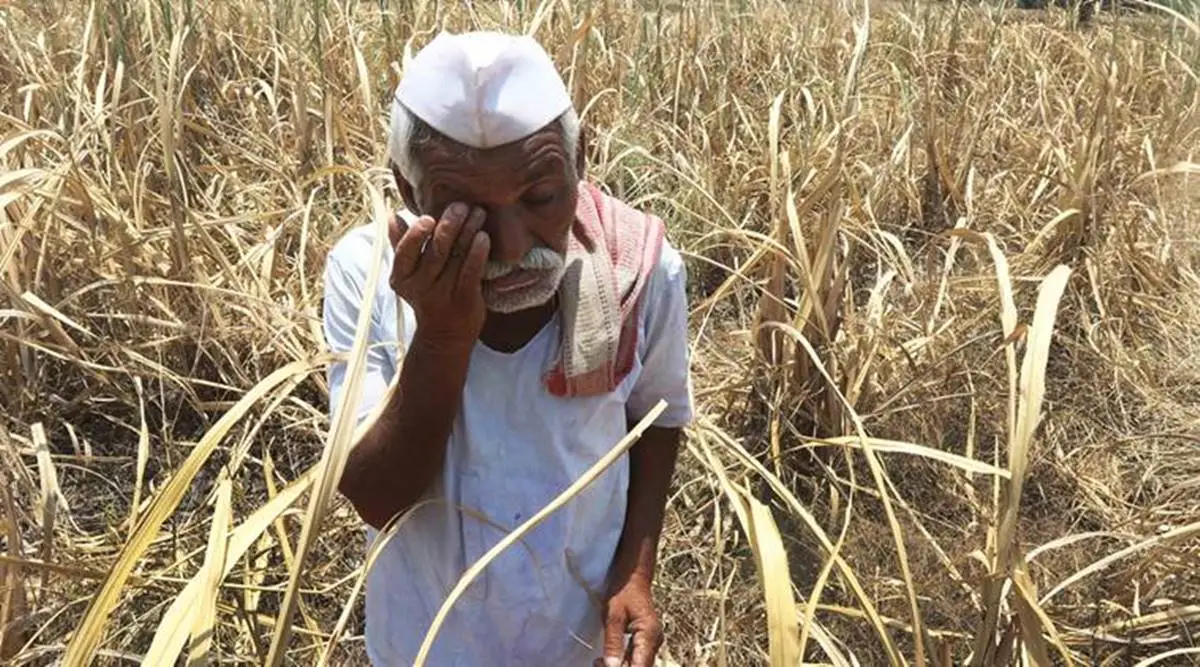 The NCRB data shows the number of farmers’ suicides in the state has remained higher than 3,500 in 2014, 2015, 2016 and 2019.
The NCRB data shows the number of farmers’ suicides in the state has remained higher than 3,500 in 2014, 2015, 2016 and 2019.DESPITE various farmer welfare schemes, including a loan waiver in 2017, Maharashtra recorded 3,927 farmers’ suicide in 2019 — the highest in the country, which registered a total of 10,281 suicides in the farm sector last year, according to data released by NCRB.
“Maharashtra has been at the forefront, pushing agriculture reforms. The state had in 2006 enforced agricultural reforms, including contract farming, under the then Congress-NCP government. But, of the 1.56 crore farmers in the state, not more than 50,000 have, so far, taken up contract farming,” a senior official in the state Agriculture department said. The subsequent government, led by the BJP, too, had stressed group farming and extended financial incentives up to Rs 1 crore, the official added.
In 2017, then Maharashtra chief minister Devendra Fadnavis announced the Chhatrapati Shivaji Maharaj Shetkari Sanman Yojna, a farm loan waiver of Rs 35,000 crore for 89 lakh farmers.
The NCRB data shows the number of farmers’ suicides in the state has remained higher than 3,500 in 2014, 2015, 2016 and 2019. NCRB has not recorded the numbers for 2017 and 2018, and has provided no reason for not doing so.
In 2016, 3,661 farm sector suicides were recorded by the bureau in Maharashtra out of a total number of 11,379 such suicides. The number for 2019, the next year for which data has been recorded, is an increase of 266.
In 2014, more than 4,000 farmers took the extreme step. Severe drought and hailstorm leading to crop loss were attributed as the main reason behind farmers getting entrapped in a debt circle that year. In 2015, a total of 4,291 farmers’ suicides were reported in the state.
“The main reason for farmers’ suicide is financial crisis. When farmers fail to get a price for the farm produce which is more than what he has invested, it upsets the calculations and pushes him into debt trap,” said Kishore Tiwari, president of Vasantrao Naik Shetkari Swavalamban (VNSS) mission, the state task force on farm distress. “The financial institutions that are supposed to extend credit at low interest to farmers are not very cooperative. Especially, small and marginal farmers bear the brunt more as they have no agriculture allied work to help them tide the financial losses due to failed crop.”
Soon after it came to power at the end of 2019, the Maha Vikas Aghadi government rolled out the Mahatma Jyotiba Phule Shetkari Karj Mukti Yojana, a fresh loan waiver scheme with an estimated expenditure of Rs 20,000 crore. While the state has so far credited nearly Rs 15,000 crore into the accounts of 20 lakh farmers, an additional Rs 5,000 crore is in the process of being released.
Assured prices for agricultural produce are seen as a more lasting solution to address the crisis than loan waivers. “Unless agriculture is based on assured income and higher production, farmers cannot escape the debt trap,” former agriculture minister Anil Bonde said.
Under new laws passed by the Modi government last month, the farmers will provide the crop which the companies require. The quality and quantity will be planned and, therefore, farmers will not have to worry about loss.
The last few weeks have seen farmers protesting against the new legislation. The government has said the laws promise assured income and proportionate profit share between farmers and companies in the contract-farming system and thus would mitigate financial losses faced by land tillers. The Uddhav Thackeray-led Maha Vikas Aghadi (MVA) government in the state has put a stay on their implementation and set up a cabinet sub-committee to decide the state government’s policy on the new legislation.
Starting Friday, BJP MPs and MLAs have started visiting farmers in villages across the state to explain to them the new farm laws. The campaign will be spread across Vidarbha, Marathwada, north and western Maharashtra as well as Konkan region.
📣 The Indian Express is now on Telegram. Click here to join our channel (@indianexpress) and stay updated with the latest headlines
For all the latest India News, download Indian Express App.